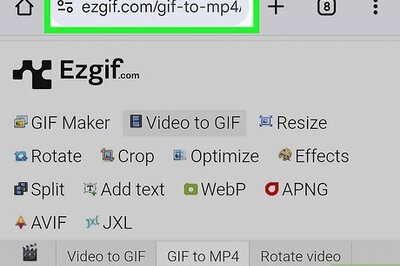
views
What does “beekeeping age” mean?
Beekeeping age refers to an attractive man in his 40s or 50s. Beekeeping age is a slang term used to describe an attractive, mature, and charismatic older person. Although people typically use the phrase to compliment older men on social media, women might also be referred to as being “beekeeping age.” “Beekeeping age” became popular in 2023 as a TikTok sound from a 2020 episode of the adult cartoon show Rick and Morty.
Where does “beekeeping age” come from?
Beekeeping age comes from an episode of Rick and Morty. In the episode, a teenage girl watches another character’s father (Jerry) take care of his beekeeping boxes in the backyard. As the girl talks about how cute it is, she realizes and rationalizes her attraction to Jerry. At one point, she asks her friend how old Jerry is, saying that he’s “obviously beekeeping age.” At the end of the girl’s monologue, she says to the daughter, “Summer, I want to f*ck your dad” and the daughter replies, “Oh, really?” After the episode aired on May 11, 2020, the phrase was mostly only shared as an inside joke between Rick and Morty fans. The term became popular in 2023 because of a trend on TikTok where creators lip-synched to the scene or talked about attractive older men as being “beekeeping age.” Jerry, the father in Rick and Morty, is actually only 35 years old, but the phrase is often used to describe people in their 40s and 50s.
Using “Beekeeping Age”
Say that an older person you find attractive is beekeeping age. If you see a clean, well-dressed man or woman with a little gray at their temples, you might comment or post on social media that they’re definitely beekeeping age. If you see this kind of person IRL, you point them out to your friend as someone who’s beekeeping age. “Hugh Jackman is definitely beekeeping age. ???? No further questions.” “The person that sat down next to me is so hot. Definitely beekeeping age. Should I ask them out?” “She’s kind of beekeeping age. Is she single?”
Say “thank you” if someone says you’re beekeeping age. Beekeeping age a compliment that means you’re both attractive and charming for your age. When someone comments “beekeeping age” on your post (or says it about you IRL), they’re saying you’re handsome, fit, and totally hot. Them: “He’s most def beekeeping age”You: “I had to Google this to see what it means lol, thank you!” Them: “Do you think he keeps bees? ????????”You: “Aw, you made my day! Thank you for that!”
Why is the term” beekeeping age” popular?
Beekeeping age doesn’t imply that there’s a wealth or power imbalance. In age-gap relationships, people often worry that the younger partner is being exploited or that one partner is only dating the other to gain money or social status. However, beekeeping age can be applied to anyone, and just implies that they have enough time and money to keep bees in their off-time. According to professional matchmaker Julia McCurley, age-gap relationships might be considered less socially acceptable if the gap is over 10 years. Those in a relationship with a gap over 10 years tend to be given derogatory labels like “sugar daddy,” “trophy wife/husband,” “gold digger,” or “boy toy.” However, “beekeeping age” doesn’t come with the same stigma. Beekeeping age describes people in all tax brackets and social circles—famous or not.
Beekeeping age is a gender-neutral alternative to DILF. Unlike “DILF” or other similar slang terms, “beekeeping age” doesn’t imply a certain gender. Although you typically see people commenting that men are beekeeping age, there’s nothing stopping women from being described as beekeeping age, too. Some people worry that “beekeeping age,” which often describes men, discourages women from becoming beekeepers. Although beekeeping is considered a male-dominated industry, about ⅓ of people in the beekeeping industry identify as women.
Other Slang Words for Beekeeping-Aged People
DILF A DILF (which stands for “Dad I’d Like to F*ck) is an attractive older man. Unlike people who are “beekeeping age,” DILFs are usually fathers with real children. A DILF can be called beekeeping age, but a person who is beekeeping age doesn’t always fit into the DILF category. “Don’t look now, but there’s a hot DILF who’s totally checking you out over there.” “This singer is a total DILF—he’s beekeeping age, for sure. What do you think?” A female version of a DILF is a MILF (“Mom I’d Like to F*ck”).
Silver fox Silver fox typically refers to attractive middle-aged men with mostly gray or white hair. Women can also be called silver foxes, however, male celebrities are more often referred to this way. Attractive middle-aged women might be called silver vixen or cougars (women who often date younger partners) instead. “Cary Grant was such a silver fox. I rewatch his movies every day.” “This silver fox came up to me last night and asked for my number. I think I’m going to call him tonight.”
Zaddy You might have heard of “daddy,” which refers to an attractive older man. However, “zaddy” refers to a man who not only has the charm of age, but a great sense of fashion, looks, confidence, and charisma. “This zaddy is so fine. Have you seen the selfies he posted last week?” “The quarterback for the Kansas City Chiefs is giving total zaddy vibes.” This term was popularized by American singer and rapper Ty Dolla $ign in his 2016 song “Zaddy.”
















Comments
0 comment